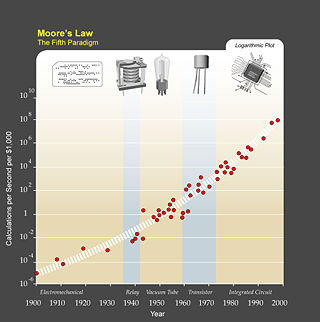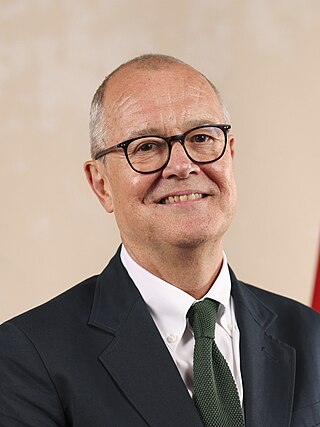Futures, Foresight and Emerging Technology unit
In 1993, the then-Chancellor of the Duchy of Lancaster, William Waldegrave, released a white paper, Realising our Potential - A Strategy for Science, Engineering and Technology, which made clear the importance of science, engineering and innovation in the public sector, and the establishment of a future planning service to anticipate threats and opportunities. [9] [10] The first "phase" of Foresight began in 1994, with its first report in 1995. [9] [11]
The unit looks to the future, as envisaged by the original white paper, focusing on what science can tell us about how the world could develop and what effects potential interventions might have. This enables civil servants and the public sector to plan for the long term by providing a view of potential futures under a variety of scenarios. [12]
Foresight projects address broad policy areas and issues to enable long-term resillence and policy planning, whereas Emerging Technologies (previously Horizon Scanning) conducts smaller projects across the full policy spectrum and increases the Government's capability to think about the future systematically. [13]

The Civil Service of the United Kingdom is the permanent bureaucracy or secretariat of Crown employees that supports His Majesty's Government, which is led by a cabinet of ministers chosen by the Prime Minister of the United Kingdom of Great Britain and Northern Ireland.

The Cabinet Office is a ministerial department of the Government of the United Kingdom. It is responsible for supporting the prime minister and Cabinet. It is composed of various units that support Cabinet committees and coordinate the delivery of government objectives via other departments. As of December 2021, it had over 10,200 staff, mostly civil servants, some of whom work in Whitehall. Staff working in the Prime Minister's Office are part of the Cabinet Office.

The Number 10 Policy Unit is a body of policymakers based in 10 Downing Street, providing policy advice directly to the British Prime Minister. Originally set up to support Harold Wilson in 1974, it has gone through a series of guises to suit the needs of successive prime ministers, staffed variously by political advisers, civil servants and more recently a combination of both.
Forfás was the national policy advisory board for enterprise, trade, science, technology and innovation in Ireland. The agency was established in January 1994 under the Industrial Development Act, 1993 and was run by a board appointed by the Minister for Enterprise, Trade and Employment, to whom the agency was responsible. Forfás was dissolved on 1 August 2014 and its functions were transferred to the Department of Enterprise, Trade and Employment, Enterprise Ireland, the Industrial Development Authority and the Health and Safety Authority.

Futures studies, futures research, futurism, or futurology is the systematic, interdisciplinary and holistic study of social/technological advancement, and other environmental trends; often for the purpose of exploring how people will live and work in the future. Predictive techniques, such as forecasting, can be applied, but contemporary futures studies scholars emphasize the importance of systematically exploring alternatives. In general, it can be considered as a branch of the social sciences and an extension to the field of history. Futures studies seeks to understand what is likely to continue and what could plausibly change. Part of the discipline thus seeks a systematic and pattern-based understanding of past and present, and to explore the possibility of future events and trends.
The UK Government Chief Scientific Adviser (GCSA) is the personal adviser on science and technology-related activities and policies to the Prime Minister and the Cabinet. They are also the head of the Government Office for Science.

Research Councils UK, sometimes known as RCUK, was a non-departmental public body that coordinated science policy in the United Kingdom from 2002 to 2018. It was an umbrella organisation that coordinated the seven separate research councils that were responsible for funding and coordinating academic research for the arts, humanities, science and engineering. In 2018 Research Councils transitioned into UK Research and Innovation (UKRI).

Dame Angela Ruth McLean is professor of mathematical biology in the Department of Biology, University of Oxford, and Chief Scientific Adviser to the UK Government.
Science advice is the process, structures and institutions through which governments and politicians consider science, technology and innovation information in policy- and decision- making. Across different national governments and international bodies, there are a variety of structures and institutions for scientific advice. They reflect distinctive cultures and traditions of decision-making, which Sheila Jasanoff has termed the ‘civic epistemology’ through which expert claims are constructed, validated or challenged in a given society.

The Department for Business, Energy, and Industrial Strategy (BEIS) was a ministerial department of the United Kingdom Government, from July 2016 to February 2023.

The secretary of state for business and trade (business secretary), is a secretary of state in the Government of the United Kingdom, with responsibility for the Department for Business and Trade. The incumbent is a member of the Cabinet of the United Kingdom.

The Malaysian Industry Group High Technology (MIGHT) is a non-profit technology think tank under the purview of the Ministry of Science, Technology and Innovation (Malaysia). It was established in 1993 to support the Science Advisor to the Prime Minister and leverage multi-disciplinary and inter-ministerial synergies from both industry and government.

Sir Patrick John Thompson Vallance is a British physician, scientist, and clinical pharmacologist who has served as Minister of State for Science in the Department for Science, Innovation and Technology since July 2024. He previously served as the Chief Scientific Adviser from 2018 to 2023.
The Economic and Domestic Affairs Secretariat (EDS) is a secretariat in the United Kingdom Cabinet Office.

Andrew John Griffith is a British Conservative politician and former senior media executive who has been the Member of Parliament (MP) for Arundel and South Downs since 2019. He has served as Shadow Secretary of State for Science, Innovation and Technology since July 2024.
The Principal Scientific Adviser (PSA) is the chief advisor to the Government of India on matters related to scientific policy. It is currently a Cabinet Secretary level position created in 1999 by the Atal Bihari Vajpayee government. The first appointed Principal Scientific Adviser was A. P. J. Abdul Kalam. This was followed by Rajagopala Chidambaram who held the rank of a Minister of State and was the PSA for 16 years. The current PSA is Ajay Kumar Sood.
The Scientific Advisory Group for Emergencies (SAGE) is a British Government body that advises central government in emergencies. It is usually chaired by the United Kingdom's Chief Scientific Adviser. Specialists from academia and industry, along with experts from within government, make up the participation, which will vary depending on the emergency. SAGE gained public prominence for its role in the 2020 COVID-19 pandemic in the United Kingdom.
Horizon scanning (HS) or horizon scan is a method from futures studies, sometimes regarded as a part of foresight. It is the early detection and assessment of emerging technologies or threats for mainly policy makers in a domain of choice. Such domains include agriculture, environmental studies, health care, biosecurity, and food safety.

The Office for Life Sciences (OLS) is part of the British government. The organisation supports the delivery of the UK Government's life sciences and innovation policy by connecting decision making across government. Informed by productive engagement with industry, the OLS promotes research, innovation, and technology within government for the improvement of healthcare.

The Department for Science, Innovation and Technology (DSIT) is a ministerial department of the Government of the United Kingdom. It was established on 7 February 2023 by a cabinet reshuffle under the Rishi Sunak premiership.












